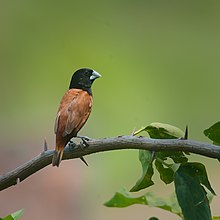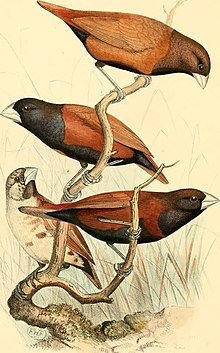| Chestnut munia | |
|---|---|

| |
| Lonchura atricapilla jagori in Cebu, Philippines | |
| Conservation status | |
 Least Concern (IUCN 3.1) | |
| Scientific classification | |
| Domain: | Eukaryota |
| Kingdom: | Animalia |
| Phylum: | Chordata |
| Class: | Aves |
| Order: | Passeriformes |
| Family: | Estrildidae |
| Genus: | Lonchura |
| Species: | L. atricapilla |
| Binomial name | |
| Lonchura atricapilla (Vieillot, 1807) | |

| |
| range | |
The chestnut munia or black-headed munia (Lonchura atricapilla) is a small passerine. It was formerly considered conspecific with the closely related tricoloured munia, but is now widely recognized as a separate species. This estrildid finch is a resident breeding bird in Bangladesh, Brunei, Cambodia, China, India, Indonesia, Laos, Malaysia, Burma, Nepal, the Philippines, Singapore, Taiwan, Thailand, Vietnam and Hawaii. It also has been introduced to all the Greater Antilles and Martinique in the Caribbean.
Before 1995, it was the national bird of the Philippines, where it is known as mayang pula ("red maya") because of its brick red patch on the lower back which is visible only when it flies. (This distinguishes it from other birds locally called maya, notably the predominantly brownish "mayang simbahan" (tree sparrow) which is more common in urban areas.)
Subspecies
The chestnut munia has several subspecies that are recognized, including:
- Lonchura atricapilla atricapilla
- Lonchura atricapilla rubroniger
- Lonchura atricapilla sinensis
- Lonchura atricapilla formosana
- Lonchura atricapilla deignani
- Lonchura atricapilla brunneiceps
- Lonchura atricapilla jagori
- Lonchura atricapilla selimbauensis
- Lonchura atricapilla obscura
- Lonchura atricapilla batakana
Description

Small, sexes alike, races differ slightly in intensity of color. in jagori Ad whole head, breast center of belly, and undertail coverts black; back, wing, and sides of belly chestnut, brighter on underparts, duller on wings; uppertail coverts dark reddish brown, underpart buff; uppertail coverts and tail as ad. Bill silvery gray; eye chestnut; legs gray.
Habitat


The chestnut munia is a small gregarious bird which feeds mainly on grain and other seeds. It frequents open grassland and cultivation. The nest is a large domed grass structure in a bush or tall grass into which 4–7 white eggs are laid.
Characteristics

The chestnut munia is 11–12 cm in length. The adult has a stubby pale grey-blue bill, black head, and brown body, with a brick red patch on the lower back, visible only when it flies. Some races also have a black belly.
The sexes are similar, but immature birds have uniform pale brown upperparts, lack the dark head and have white to pale buff underparts.
National bird of the Philippines until 1995
The black-headed munia was the national bird of the Philippines until 1995, when that honorific was transferred to the Philippine eagle. There, due to urbanization and the resulting lack of awareness of local species, it is nowadays often confused for the Eurasian tree sparrow because that species, one of several also categorized as "maya" in the Philippines, is much more common in the urban areas.
References
- A Guide to the birds of the Philippines(2000) Robert S. Kennedy pedro C. Gonzales, Edward C, Dickinson Hector C. Miranda, jr. & Timothy H. Fisher
- Birds of India by Grimmett, Inskipp and Inskipp, ISBN 0-691-04910-6
- Munias and Mannikins by Robin Restall, ISBN 1-873403-51-8
- BirdLife International (2016). "Lonchura atricapilla". IUCN Red List of Threatened Species. 2016: e.T22729138A95007301. doi:10.2305/IUCN.UK.2016-3.RLTS.T22729138A95007301.en. Retrieved 12 November 2021.
- ^ Kennedy, Robert; et al. (21 September 2000). A Guide to the Birds of the Philippines. OUP Oxford. ISBN 0-19-854668-8.
- ^ "10 Most Common Urban Birds". 2 July 2013.
External links
| Taxon identifiers | |
|---|---|
| Lonchura atricapilla |
|
| Loxia atricapilla | |